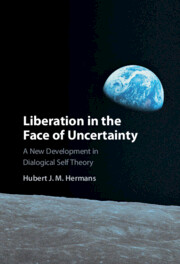Book contents
- Liberation in the Face of Uncertainty
- Liberation in the Face of Uncertainty
- Copyright page
- Dedication
- Contents
- Figures
- Tables
- Preface
- Acknowledgments
- Introduction
- Chapter 1 Playing with Plato
- Chapter 2 Centralization and Decentralization of the Self
- Chapter 3 The Other as Heaven and Hell
- Chapter 4 Re-enchantment of the World
- Chapter 5 Imprisonment and Liberation of the Self
- Chapter 6 Uncertainty in the Self
- Chapter 7 Multiple Well-Being and Other-Inclusive Happiness
- Glossary
- References
- Index
Chapter 7 - Multiple Well-Being and Other-Inclusive Happiness
Published online by Cambridge University Press: 06 January 2022
- Liberation in the Face of Uncertainty
- Liberation in the Face of Uncertainty
- Copyright page
- Dedication
- Contents
- Figures
- Tables
- Preface
- Acknowledgments
- Introduction
- Chapter 1 Playing with Plato
- Chapter 2 Centralization and Decentralization of the Self
- Chapter 3 The Other as Heaven and Hell
- Chapter 4 Re-enchantment of the World
- Chapter 5 Imprisonment and Liberation of the Self
- Chapter 6 Uncertainty in the Self
- Chapter 7 Multiple Well-Being and Other-Inclusive Happiness
- Glossary
- References
- Index
Summary
Two main forms of well-being are outlined: hedonic and eudemonic happiness as viewed from the perspective of Self-Determination Theory and from narrative psychology. Two limitations of these approaches are discussed: the lack of the other in the self and the neglect of reason. Taking these limitations into account, a model of multiple well-being is presented with four levels of inclusiveness: individual, social, human, and ecological, each with associated forms of well-being and responsibility. For each of these levels, research findings and related theoretical concepts are presented. At the collective level, the chapter summarizes the reflections of colleagues who applied Dialogical Self Theory in their own culture: African, Japanese, Chinese, and indigenous American. A comparison results in the conclusion that all of them show more open boundaries between self and nonself, more intimacy with others and nature, and less emphasis on control and manipulation of the environment.
Keywords
- Type
- Chapter
- Information
- Liberation in the Face of UncertaintyA New Development in Dialogical Self Theory, pp. 243 - 291Publisher: Cambridge University PressPrint publication year: 2022



